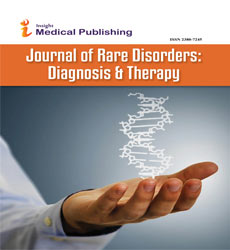Personalized Medicine and Targeted Therapies in Medical Genetics
Amina Turki
Department of Gastrointestinal and Pediatric Surgery, Oslo University, Oslo, Norway
DOI10.36648/2380-7245.10.4.179
Amina Turki*
Department of Gastrointestinal and Pediatric Surgery, Oslo University, Oslo, Norway
- *Corresponding Author:
- Amina Turki
Department of Gastrointestinal and Pediatric Surgery, Oslo University, Oslo,
Norway,
E-mail: amina@gmail.com
Received date: July 26, 2024, Manuscript No. IPRDDT-24-19724; Editor assigned date: July 29, 2024, PreQC No. IPRDDT-24-19724 (PQ); Reviewed date: August 12, 2024, QC No. IPRDDT-24-19724; Revised date: August 19, 2024, Manuscript No. IPRDDT-24-19724 (R); Published date: August 26, 2024, DOI: 10.36648/2380-7245.11.4.179
Citation: Turki A (2024) Personalized Medicine and Targeted Therapies in Medical Genetics. J Rare Disord Diagn Ther Vol.11 No.4:179.
Description
Understanding, diagnosing and treating rare disorders which, while uncommon in and of themselves, affect millions of people worldwide requires a strong grasp of medical genetics. Rare diseases are defined as ailments that affect fewer than 1 in 2,000 people. Frequently, these diseases have a genetic basis. Genetic and genomic advances have revolutionized our knowledge of many illnesses, opening the door to focused treatments, early diagnosis and in certain situations. This article explores how genetic technology and tools are transforming diagnosis, research and therapy and how medical genetics plays a role in rare conditions. Roughly 80% of uncommon illnesses are genetically based, frequently resulting from changes or mutations in a single gene. Usually inherited, these conditions can present in a multitude of ways contingent on the genes implicated and the type of mutation. The diagnosis and management of rare disorders have changed dramatically as a result of medical genetics. For those suffering from diseases that were long unknown and incurable, the field provides hope through quick genetic testing and the creation of focused treatments. Even while there are still obstacles to overcome, further developments in genetics could lead to improved results, more individualized care and eventually treatments or even cures for a variety of uncommon hereditary illnesses. The frontier of modern medicine where cutting-edge technology meet the complexity of DNA and where science gives hope to those in need is the junction of genetics and uncommon illnesses, as perceived by both patients and professionals.
Genetic examination
For many years, the process of detecting uncommon genetic illnesses was drawn out, difficult and frequently involved trial and error. This has altered with the advent of genetic testing, which enables medical professionals to identify diseases' genetic causes more rapidly and precisely. All of the genome's proteincoding regions where the majority of mutations that cause disease occur are sequenced using this method. When it comes to monogenic illnesses, WES (Whole Exome Sequencing) is incredibly successful. WGS (Whole-Genome Sequencing) the complete genome, including non-coding areas, which are increasingly understood to play a role in disease, despite being less thorough than WES. These assays target a particular gene panel that has been linked to certain diseases. For instance, all known genes linked to epilepsy may be included in a gene panel for the condition. Larger chromosomal rearrangements, duplications or deletions that sequencing techniques could miss are found by this test. By enabling early and more accurate diagnoses for numerous rare conditions, these techniques have completely changed the field of diagnostics and frequently improve clinical outcomes. Personalized medicine or treatments catered to a patient's genetic composition, is also driven by medical genetics. Treatments that specifically address the disorder's genetic origin have been developed as a result of the capacity to pinpoint particular mutations. A innovative method that gives a patient's cells a functional copy of a gene. For instance, spinal muscular atrophy and other types of inherited blindness are currently being treated with gene therapy. Using CRISPR to Edit Gene-editing technologies such as CRISPR-Cas9, albeit still mostly in the experimental stage, have the potential to rectify disease-causing mutations in a patient's DNA.
Genetic counseling's role
Pharmacogenomics the study of how an individual's genetic composition impacts how they react to medications can result in less adverse effects and more successful treatments. This is especially important for uncommon diseases where conventional treatments might not always be effective. In spite of the astounding advancements in medical genetics. A lot of individuals with uncommon illnesses still have to go through extensive testing and consult with specialists before receiving a diagnosis. Even with advances in genetic testing, access and awareness are still uneven. Mutations in distinct genes may be the cause of certain uncommon illnesses, making diagnosis and therapy more difficult. Ethical considerations: The quick speed at which genetics is developing presents ethical questions about things like gene editing's consequences and access to potentially life-saving treatments. Although potential, gene editing and enzyme replacement therapies still do not effectively treat many rare genetic illnesses. To create novel treatments and deepen our understanding of these illnesses, further study is required.
Open Access Journals
- Aquaculture & Veterinary Science
- Chemistry & Chemical Sciences
- Clinical Sciences
- Engineering
- General Science
- Genetics & Molecular Biology
- Health Care & Nursing
- Immunology & Microbiology
- Materials Science
- Mathematics & Physics
- Medical Sciences
- Neurology & Psychiatry
- Oncology & Cancer Science
- Pharmaceutical Sciences
